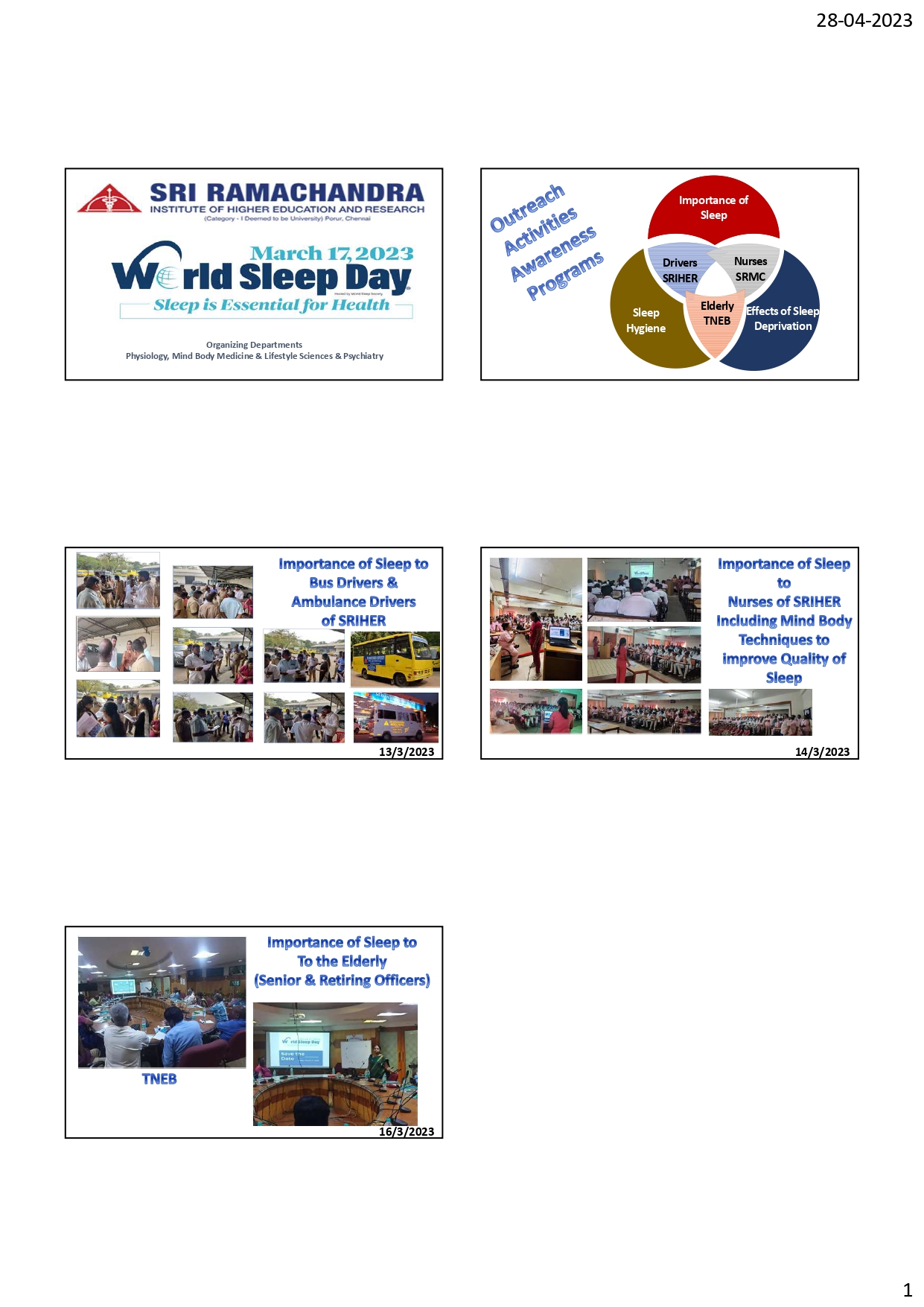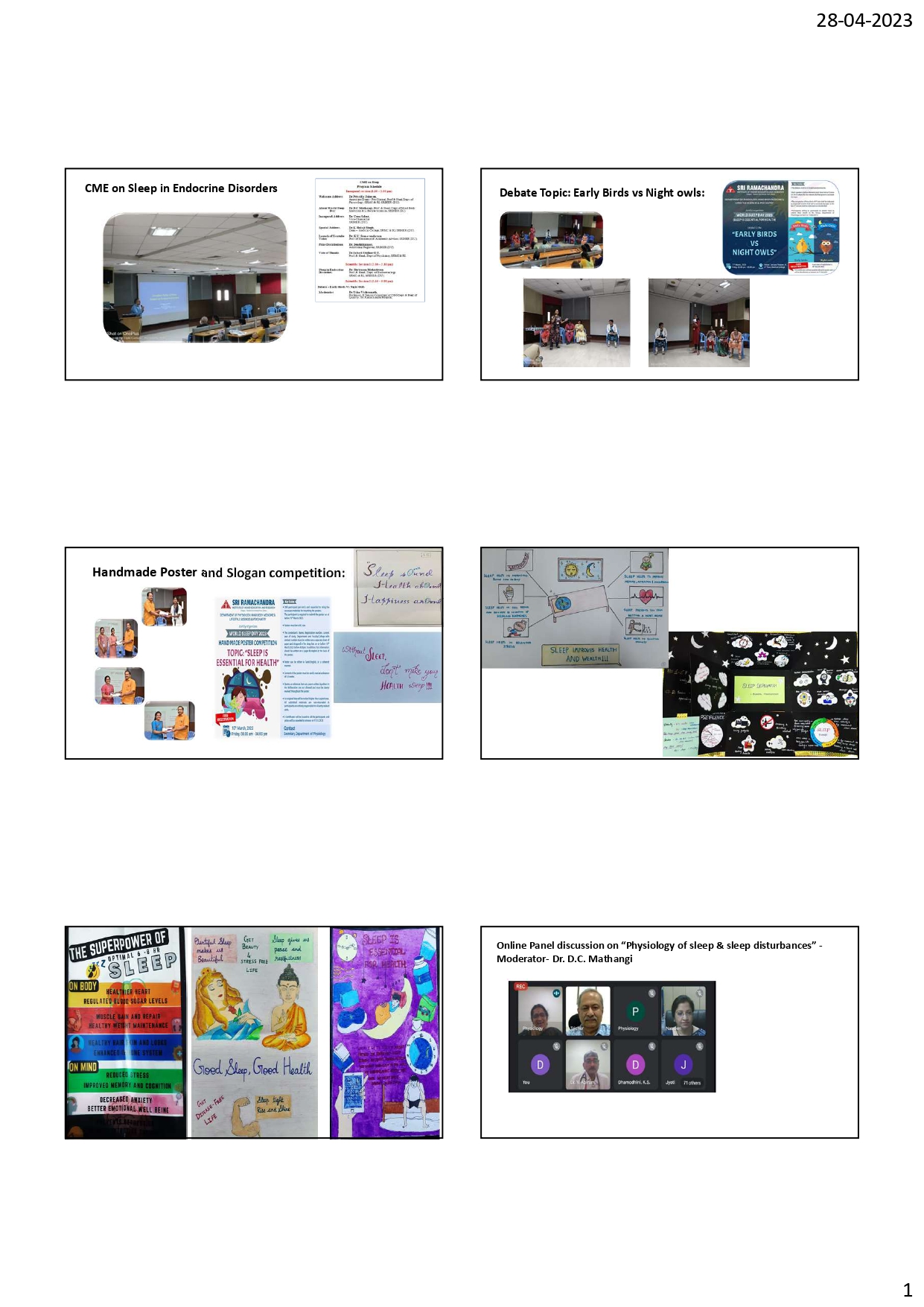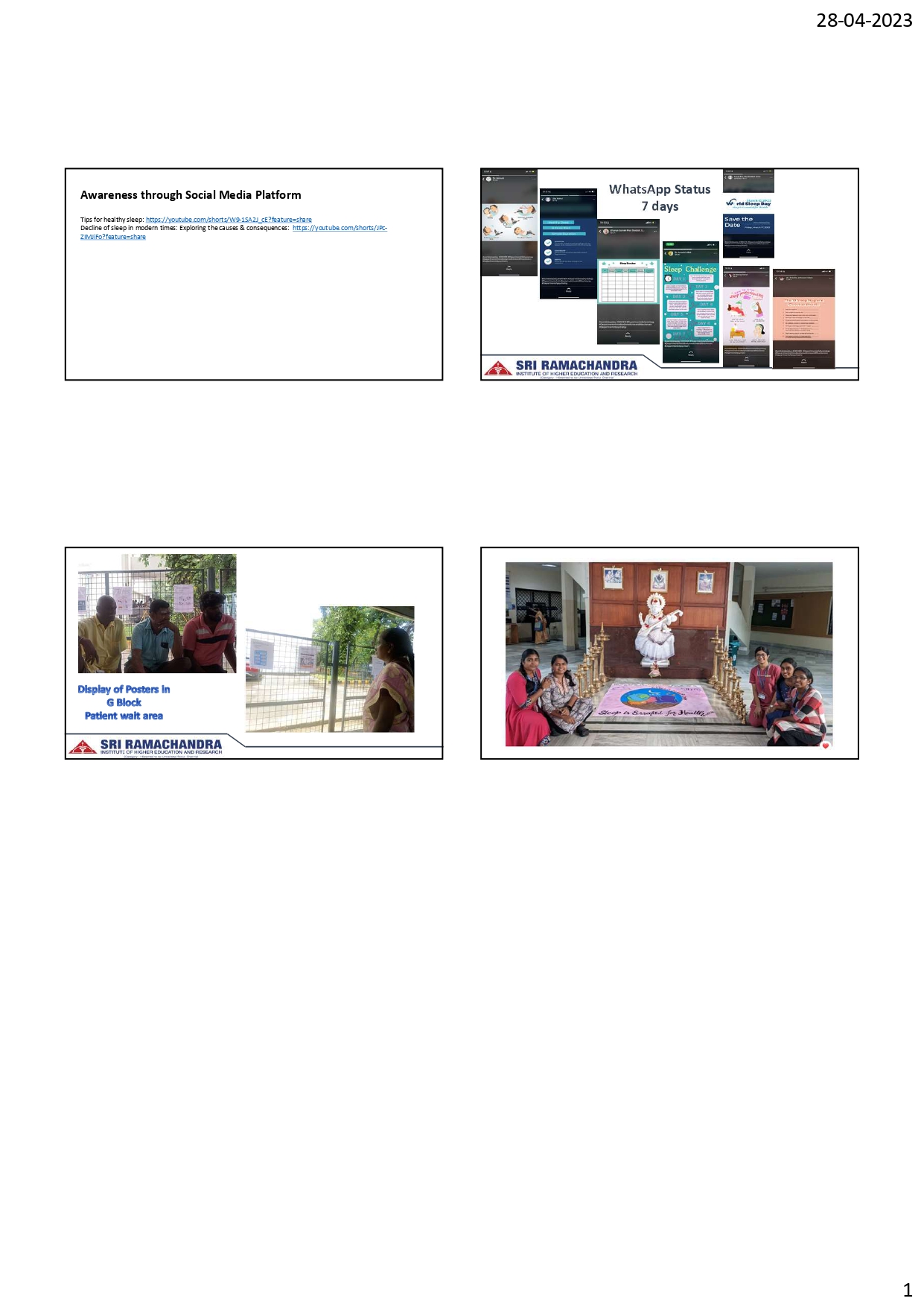Delegate: Dr. Priscilla Johnson, Dr. D. C. Mathangi, Dr. Sabari Sridhar
Affiliation: Sri Ramachandra Institute of Higher Education and Research, Chennai, TN, India
Short Bio:
Activity: World Sleep Day is a call to all sleep professionals to advocate and educate the world about the importance of sleep for achieving an optimal quality of life and improve global health. Sleep is involved with many physiologic systems such as brain function, especially memory consolidation, control of inflammation, hormone regulation, cardiovascular regulation and many other important functions, therefore insufficient sleep duration and poor sleep quality will be associated with several significant adverse health outcomes. Reduced sleep duration has been shown to cause impairments in cognitive and executive function, while poor sleep has been associated with poor mental health. Studies have demonstrated that stable bedtimes and rise times are associated with better sleep quality in young, middle-aged adults, and seniors. Regular sleepers have better mood, psychomotor performance, and academic achievement. The focus on regular sleep for 2023 is based on the benefits that regular sleep offers. The slogan for this year annual World Sleep Day is ‘Sleep is Essential for Health’. Departments of Physiology joined hands with Department of Mind Body Medicine & Lifestyle Sciences and the Department of Psychiatry of our own institution in conducting activities relating to sleep awareness in the month of March 2023.
Outreach Activities were conducted with the following objectives:
• Importance of Sleep
• Effects of insufficient quality or quantity of sleep
• Sleep Hygiene
Specific Cohort Addressed:
• Elderly retired personnel
• Bus and Ambulance Drivers
• Nursing Staff
Educating the UG students of SRIHER:
• CME on Sleep and endocrine disorders
• Debate on Night owls vs early birds
• Slogan Writing competition
• Handmade poster creation contest
Awareness among postgraduate students:
• Panel discussion on sleep and its importance
• Animal study on sleep deprivation
Other modes used for bringing awareness on sleep
• 7 day WhatsApp status on importance of sleep by Faculty & students of Physiology and Mind Body Medicine & LS
• Display of charts in the G block patient wait area with specific reference to Sleep
1. Outreach Program for elderly and retired personnel:
Insomnia in elderly is one of the crucial health issues and it remains to be the most neglected disorder. It can be modified, taken into remission with simple therapeutic approach. Identification of the problem and reaching out for help is an integral part among geriatric health management. On March 16th we connected with retired population from Tamilnadu Electricity Board, to educate them on the impact of sleep on their health. Beneficiaries were around 25. The event had simple hand out’s with pictures relevant to old age population. The session was made interactive with PPT slides and Q & A hour.
2. Awareness Program for Bus and Ambulance drivers:
Drowsy drivers pose a high risk for Road Traffic Accidents (RTA), with most of the RTA accounts due of lack of sleep among drivers. Lack of sleep due to continuous driving disrupts the homeostatic functioning of immune and endocrine system of the drivers. This leads to various deleterious effects on health ultimately ending up with severe morbid conditions such as myocardial infarction, diabetes and depression.
With this in mind, we initiated an awareness program to address this issue for drivers in our own institution. Especially during the pandemic, they were exposed to frequent night and day shifts to cater to the needs of the society, which have modified their sleep habits.
Our awareness session included making language appropriate handouts to educate them on sleep hygiene. A small group conversation with our sleep experts to help them define a sleep disorder, tailor fit their work-life balance to gain a quality sleep. Also we had a private quick consult with
few drivers who identified to have sleep disorders following the awareness program. Common queries among the drivers were about the fragmented sleep, nocturia, waking up tired in the morning, caffeine intake, how healthy is morning nap? All the questions were addressed clearly and they were encouraged to reach out for a consultation whenever needed.
3. Awareness program among nursing faculty
Fifty percent of the nurses are working at night shift, with lack of knowledge on how sleep impairment could have a major impact on cognitive decisions that they make at work as it disturbs the circadian rhythm. Importance of sleep was educated to the nursing faculties (115 beneficiaries) through an interactive discussion. Besides, the session focused on training the faculty to relax their mind and body which facilitates to achieve quality sleep. The mind body techniques were taught and guided on spot, which received a great response among the nurses.
4. CME on Sleep in Endocrine Disorders
Dr. Shriraam Mahadevan Prof. & Head, Dept. of Endocrinology, SRMC & RI, SRIHER (DU). enlightened the audience on the topic “Sleep in Endocrine Disorders”. He explained the basic physiology of circadian rhythm and its association with sleep disorders. He narrated to the audience about the scientific updates on how circadian rhythm is established, the association between the molecular clock at the cellular level and the micro cosmic rhythm. He also added how the pulsatile nature of hormone secretion can be altered due to sleep deprivation. He further explained with beautiful illustrations and recent advances on the sleep wake cycle and the role of endocrine system. Finally he mentioned about the disorders of sleep due to dysfunction of endocrine system, with core focus on circadian rhythm. His talk was lucid and very interactive which created great interest among the student audience. (Beneficiaries – 274)
5. Debate Topic: Early Birds vs Night owls:
Dr. Usha Vishwanath, Professor, & Senior Consultant of OBG Dept. & Head of Quality, Sri Ramachandra Hospital., the moderator of the debate, “Early Birds Vs Late Owls” introduced the teams who participated.
The debate focused on following topics, maintaining consistent sleep wake cycle and importance of tailoring the bedtime with the work life. Late owls stated, genetic make of people decide their sleep time and work life should be adjusted in accord to that, also they added that people being active on late evenings can be more productive than their counterpart who active on early mornings. Early birds team stated, it is necessary to keep up with the environmental cues to ensure a sustainable sleep wake cycle. They also added that human body is very much plastic in nature, so that it can be trained, new memories can be made to keep up with sleep hygiene. After placing their arguments the moderator analyzed and announced the team – Early Birds as the winner of the debate.
6. Handmade Poster and Slogan competition:
Preceding the World Sleep Day event; hand made poster and slogan competitions were conducted. Dr. Senthilkumar, Additional Registrar, SRIHER (DU) gave away the prizes to the winners. First place in the handmade poster competition (English) was awarded to Dr. Jayashree. P. MD Physiology final year. Second place in the handmade poster competition (English) was awarded to MS. Abi Meyammal , 3rd year student, B.O.T. First place in the slogan competition was awarded to Ms. Sowmya J Vaikar Msc. MBM & LS. Second place in the slogan competition was awarded to Dr. Neeraja Msc Physiology.
7. Online Panel discussion on “Physiology of sleep & sleep disturbances” – Moderator- Dr. D.C. Mathangi
The moderator introduced the panelists and welcomed the attendees. She began the session by navigating on the importance of sleep in sustaining homeostatic balances and how sleep has been disrupted in young adults in recent years.
The first speaker, Dr. T. R .Raju, discussed the unique physiological systems engaged during sleep, as well as numerous sleep research conducted at his institution, including ocular involvement during sleep.
Dr. Nasreen Akhtar then elaborated on the disruptions in physiological functioning during sleep and how exercise and sports enhance sleep. She also discussed the use of electronic devices and the impact of increased screen time on sleep habits.
Dr. Preetam Arthur discussed various sleep disorders, particularly in adolescence, and their negative consequences. He also discussed about various therapeutic modalities.(Number of beneficiaries – 130)
8. Animal Research:
Effects of exercise on select hematological parameters in sleep deprived male Wistar rats:
Aim: This study was conducted to assess the effects of exercise training on select hematological parameters in 72 hours sleep deprived Male Wistar rats.
Materials and Methods : 12 male Wistar rats were used for the study after obtaining ethical clearance. 6 rats were in exercise group A and 6 in control group B. Exercise group A alone underwent 4 weeks of exercise on motorized wheel with prior training. After that, 72 hours of sleep deprivation was employed for both the groups after completion of exercise in group A and home caged group B . Data was analyzed using appropriate statistical methods.
Results : All the select hematological parameters were reduced after sleep deprivation in both the groups. The comparison of select hematological parameters before and after sleep deprivation in exercising group A rats parameters such as basophils, RBC, hemoglobin, hematocrit were found to be significantly reduced and platelets, MCV, MCH, MCHC, MPV were significantly increased post sleep deprivation. Comparison of select hematological parameters between exercised group A and sedentary group B post 72 hours of sleep deprivation showed average values of monocyte, RBC, hemoglobin, hematocrit to be significantly increased in group B rats.
Conclusion : In conclusion sleep has an influence in maintaining body’s homeostasis as we see significant decrease in most of the select hematological parameters post 72 hours of continuous sleep deprivation in male wistar rats of both groups. Though not statistically significant total white blood cells were increased in group A rats which implies trigger in the immune system when exposed to acute stress environment.
9. Awareness through Social Media Platform
YouTube Live:
A live YouTube video was initiated to address the health disorders due to lack of sleep. It includes live interview with sleep specialist, the questions were placed strategically to explore the deleterious effect of sleep deprivation, and ways to gain good quality sleep. Here we used single window awareness spreading method, which involve in passive spread of sleep awareness targeted over a large group of population across the nation.
Tips for healthy sleep: https://youtube.com/shorts/W9-1SA2J_cE?feature=share
Decline of sleep in modern times: Exploring the causes & consequences: https://youtube.com/shorts/JPc-ZIMJiFo?feature=share
WhatsApp Status:
Especially during the COVID -19 pandemic, the short term goal oriented social updates have proven to gain more attention from the general public. Based on this evidence, we implemented One-Week WhatsApp Status update awareness by our faculties. The focus of this initiative was to create awareness among sleep hygiene and enable people with sleep disorder to reach out for help.
To achieve this, we used interactive posts to engage people which helped them to have a quick fix of their sleep hygiene through simple steps. In addition, this also sensitized the viewers that adequate and quality sleep is an integral part of healthy lifestyle. Outcome for this effort was seen through people’s response. They came forward with questions on how to measure their quality of sleep, clarified various misconception about sleep, also asked about techniques to achieve healthy sleep.
10. Strategic placement of Sleep Hygiene Posters:
Posters were erected at strategic location, to gain attention of patients and caregivers. The posters depicted awareness on sleep using simple regional language. It was also made illustrious to gain the attention of illiterate population.
Location: Sri Ramachandra Institute of Higher Education and Research
Date of Activity: 13 – 17 MARCH 2023
Submitted by: DR.PRISCILLA JOHNSON




